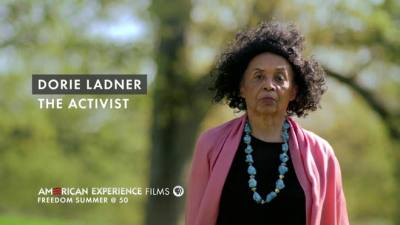Shadow Politics, April 18, 2021
Shadow Politics with Senator Michael Brown and Maria Sanchez and guest Dorie Ladner
In Honor of DC Emancipation Day, we have guest DORIE LADNER-Civil Rights Activist! Inspired by the work of Medgar Evers, Dorie Ladner has dedicated much of her life to the work of the civil rights movement. Deeply affected by the murder of Evers, as well as the four little girls killed in the bombing of the 16th Street Baptist Church in Birmingham, Alabama, Ladner welcomed the help and the attention that Freedom Summer volunteers brought to Mississippi in 1964. On this DC Emancipation Day, we will speak with Ms. Ladner to see if we can learn from her experiences as we pursue the goal of DC statehood. This busy week included the House Committee on Oversight and Reform mark-up and advance of H.R.51, the Washington, DC Admission Act. We are excited to talk with Ms. Dorie Ladner as her years of activism in civil rights in America is an inspiration to all of us who work on making every American citizen equal!!
Guest, Dorie Ladner

Dorie Ladner was “born a rebel against oppression.” A native of the Hattiesburg, Mississippi community known as Palmer’s Crossing, she spent her childhood fighting back against the oppressive racial norms that governed the lives of Black people there. Her mother taught all of her eight children that they “were as good as anybody.”
Accommodating to white supremacy was not in her makeup. One day when she was twelve, Dorie was reading an issue of Jet Magazine at a convenience store, when the store’s white clerk “slapped [her] on the behind.” “I turned around and started beating him with the bag of doughnuts,” she recalled. When she told her mother of the incident, her mother replied “you should have killed him. Don’t ever let any white man touch you wrong.” So, explained Dorie, when she and her sister Joyce became part of the Movement, they were simply “doing what they prepared us to do.”
The Ladner family was close to Vernon Dahmer and his family. Dahmer was the president of the Forrest County branch of the NAACP and a vocal proponent of voting rights. Dahmer helped the Ladner sisters form an NAACP Youth Council in nearby Hattiesburg. Clyde Kennard, another older activist who attended school at the University of Chicago, agreed to serve as the youth council’s advisor. Pretty soon, Kennard and Dahmer were bringing the Ladner sisters to Jackson for statewide NAACP meetings. “I’m so grateful that I was exposed to people who at the time had vision,” remembered Dorie Ladner.
Both Dahmer and Kennard were killed because of their leadership in civil rights struggle. Both deaths profoundly affected Dorie and her sister.
The Ladners met Medgar Evers on one of their Jackson trips, and he also became an important mentor when they enrolled in Jackson State College. “Every Wednesday, we would go over and talk to him about freedom, which was abstract; all we wanted to know was about our freedom,” Dorie explained. In 1961, with Evers’ guidance, Ladner joined the protests of the “Tougaloo [College] Nine,” a group of students from Tougaloo who were arrested for trying to integrate the public library in downtown Jackson. As a consequence of her activism, Ladner was expelled from Jackson State. She and her sister later matriculated at Tougaloo College, which was known for its liberal stance towards student activism.

Emma Bell, Dorie Ladner, Dona Richards, Sam Shirah, and Doris Derby outside 16th Street Baptist Church funeral, September 1963, Danny Lyon, Memories of the Southern Civil Rights Movement 96-97, dektol.wordpress.com
When Evers was assassinated in June, 1963, it was especially hard on Dorie and her sister. The anger that had been building up after every murder and lynching, especially those of Clyde Kennard and Emmett Till, reached its boiling point the next day. The day after Evers’ murder, Dorie ran up to two white police officers sitting in front of the Jackson’s Black Masonic Temple (which also served as the NAACP’s headquarters) and shouted at them, “Where were you last night? Why are you here now? Shoot! Shoot! Shoot us in the back like you did Medgar Evers.”
Despite her family’s insistence that she get an education, Dorie dropped out of Tougaloo three separate times to work for SNCC full-time. She once told her sister Joyce, “I can’t stay in school and know my people are suffering.” In the summer of 1962, she started working on SNCC’s voter registration projects in the Delta. Three years later, she became SNCC’s project director in Natchez, Mississippi.
Although Ladner was raised never to let fear prevent her from doing what she knew was right, she understood the constant possibility and danger of white violence. Upon entering Natchez with former SNCC chair Chuck McDew and field secretary George Greene, McDew handed her a gun for protection. Despite never needing to use it, Ladner was certain she would’ve if she needed to. She once said, “I didn’t think about the ramifications of anything like that; it was save yourself, survive.”
Shadow Politics

Shadow Politics is a grass roots talk show giving a voice to the voiceless. For more than 200 years the people of the Nation's Capital have ironically been excluded from the national political conversation. With no voting member of either house of Congress, Washingtonians have lacked the representation they need to be equal and to have their voices heard. Shadow Politics will provide a platform for them, as well as the millions of others nationwide who feel politically disenfranchised and disconnected, to be included in a national dialog.
We need to start a new conversation in America, one that is more inclusive and diverse and one that will lead our great nation forward to meet the challenges of the 21st century. At Shadow Politics, we hope to get this conversation started by bringing Americans together to talk about issues important to them. We look forward to having you be part of the discussion so call in and join the conversation. America is calling and we're listening… Shadow Politics is about America hearing what you have to say. It's your chance to talk to an elected official who has spent more than 30 years in Washington politics. We believe that if we start a dialog and others add their voices, we will create a chorus. Even if those other politicians in Washington don't hear you — Senator Brown will. He's on a mission to listen to what America has to say and use it to start a productive dialog to make our democracy stronger and more inclusive. If we are all part of the solution, we can solve any problem.









